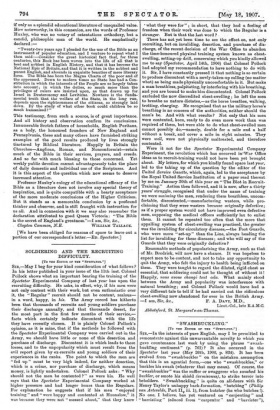SOLDIERING AND THE RECRUITING DIFFICULTY.
[To TB EDITOR Or TIM “EPROTATOR.1 SIII,—May I beg for your kind consideration of what follows ? In his letter published in your issue of the 11th inst. Colonel Pollock shows what an important bearing the training of the Spectator Experimental Company of last year has upon the recruiting difficulty. He asks, in effect, why, if his men were not only content with their work, but even enthusiastic over it, the " Regular " recruit should not be content, zealous— in a word, happy, in his. The Army record has hitherto been that thousands of recruits and young soldiers purchase their discharge annually, and that thousands desert, for the most part in the first few months of their service,— facts which certainly indicate discontent with the life they have recently chosen. It is plainly Colonel Pollock's opinion, as it is mine, that if the methods he followed with the Spectator Experimental Company were carried out in the Army, we should have little or none of this desertion and purchase of discharge. Discontent it is which leads to these losses, and to the unpopularity which must result from the evil report given by ex.recruits and young soldiers of their experiences in the ranks. The point to which the men are "fed up" must be very high indeed, for neither desertion, which is a mime, nor purchase of discharge, which means money, is lightly undertaken. Colonel Pollock asks, "Why should not the men be contented ?" as were his. He well says that the Spectator Experimental Company worked at higher pressure and bad longer hours than the Regulars. For explanation he suggests that if his men "enjoyed training" and "were happy and contented at Hounslow," it was because they were not "messed about," that they knew 'what they were for " ; in short, that they had a feeling of freedom when their work was done to which the Regular is a stranger. But is that the last word ?
There has not yet been time to see the effect on, not only recruiting, but on invaliding, desertion, and purchase of discharge, of the recent decision of the War Office to abandon the time-honoured .physical training system known as chest. swelling, setting-up drill, concerning which you kindly allowed me to say (Spectator, April 14th, 1906) that Colonel Pollock bad adopted my recommendation to have nothing to do with it. Sir, I have constantly pressed it that nothing is so certain to produce discontent with a newly-taken-up calling (no matter what) as being made physically uncomfortable in it. But make a man breathless, palpitating, by interfering with his breathing, and you are bound to make him discontented. Colonel Pollock excluded the now discredited thest-swelling ; he left the men to breathe as nature dictates,—as the horse breathes, walking, trotting, charging. He recognised that as the military horse's breathing is no concern of the authorities, neither should the man's be. And with what results ? Not only that his men were contented, keen, ready to do even more work than was required of them, but were able to do what chest-swelled men cannot possibly do,—namely, double for a mile and a half without a break, and cover a mile in eight minutes. They were well, were not physically maltreated, and therefore contented.
Were it not for the Spectator Experimental Company Experiment, the revolution which has occurred in•War Office ideas as to recruit-training would not have been yet brought about. My letters, for which you kindly found space last year, led to the taking up of the question by the editor of the United Service Gazette, which, again, led to the acceptance by the Royal United Service Institution of a paper read thereat by me on January 30th of this year on "The Blot in Recruit. Training." Action then followed, and it is now, after a thirty years' struggle, recognised that under. the name of training we were maiming the men, rendering them breathless, unbornfortable, discontented,—manufacturing wasters, while proclaiming that they were wasters because originally defective; as if a proper system would not have improved even defective men, supposing the medical caters sufficiently lax to enlist them. It cannot be repeated too often that the more that appalling system of chest-swelling was practised, the greater was the invaliding for circulatory diseases,—the Foot Guards, who were more " set-up " than the Line, always heading the list for invaliding for these diseases ; and who will say of the Guards that they were originally defective ?
Reasonable methods of popularising the Army, such as that of Mr. Brodrick, will now have a chance. It was hopeless to expect men to be content, and not to take any opportunity ta quit the Army, who felt the injury to health being inflicted on them. They were taught to regard the dilated, rigid chest as essential, that soldiering could not be thought of without it! Happily, nous ovens change tout cela. What mainly stood between the Army and popularity was interference with
natural breathing ; and Colonel Pollock would have had a very different tale to tell if be had carried out the ridiculous chest-swelling now abandoned for ever in the British Army.
—I am, Sir, &c., F. A. DAVY, M.D.,
Lieut.Col., late R.A.M.C.
Abbotsford, St. Margaret's-on-Thames.






































 Previous page
Previous page